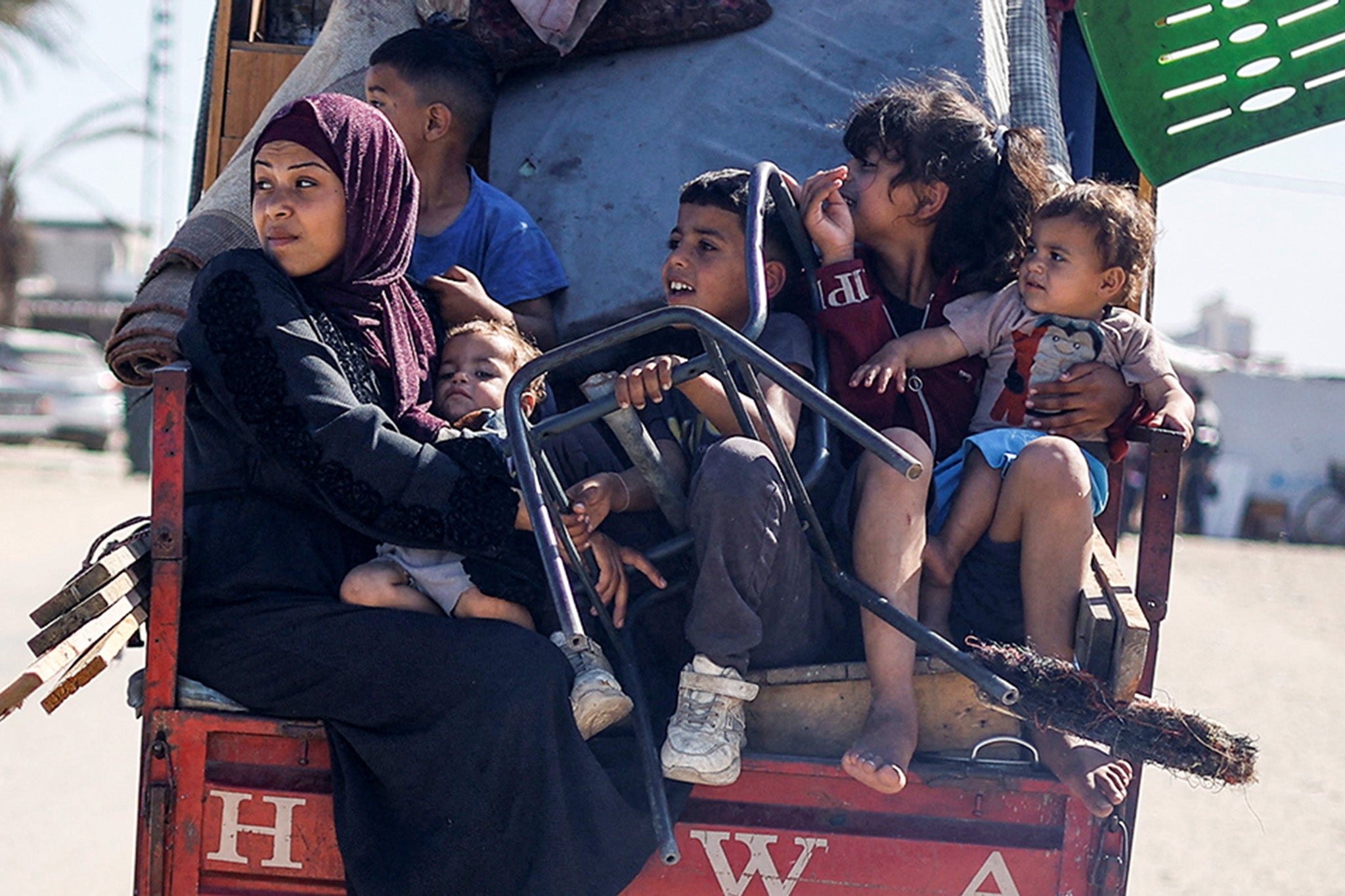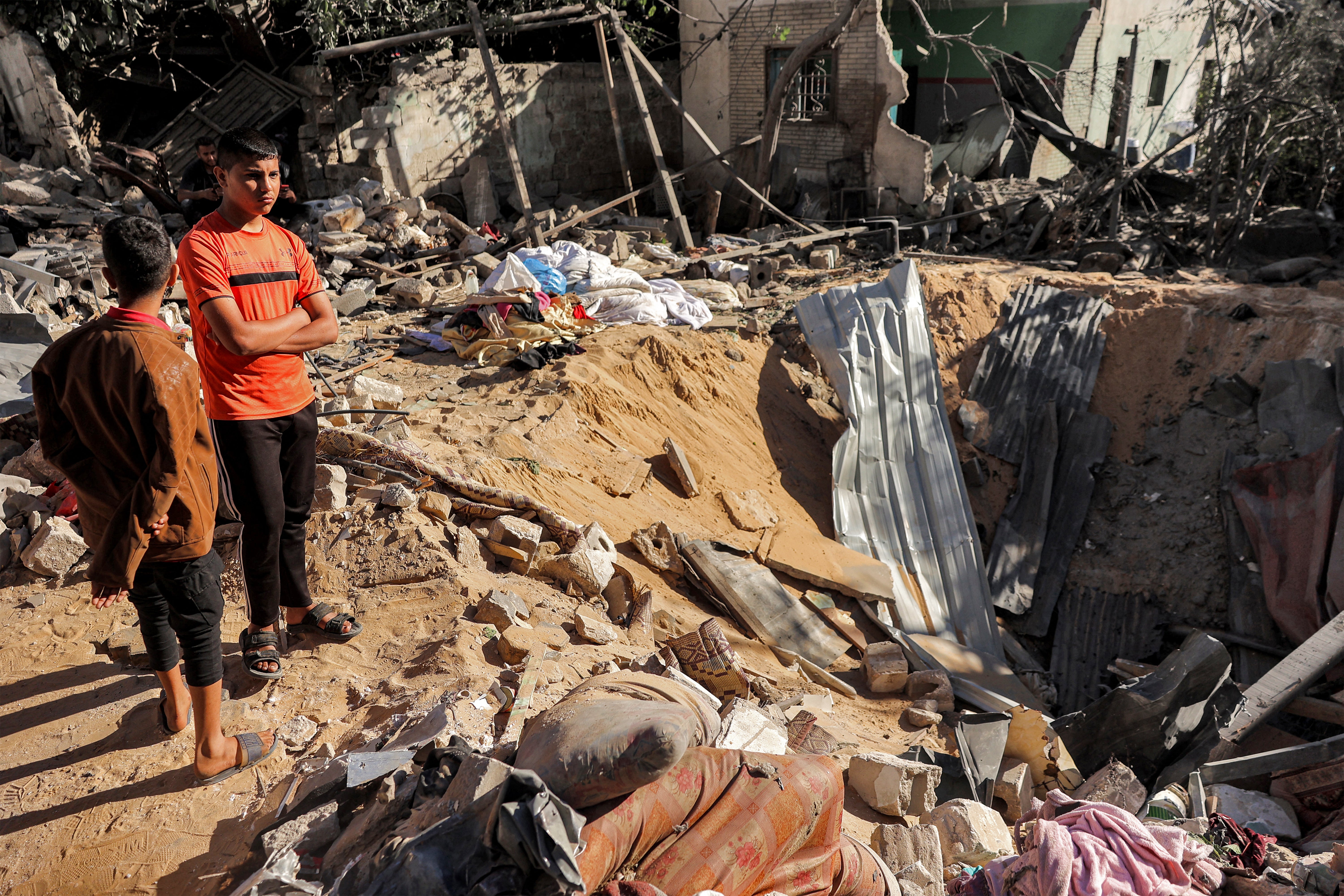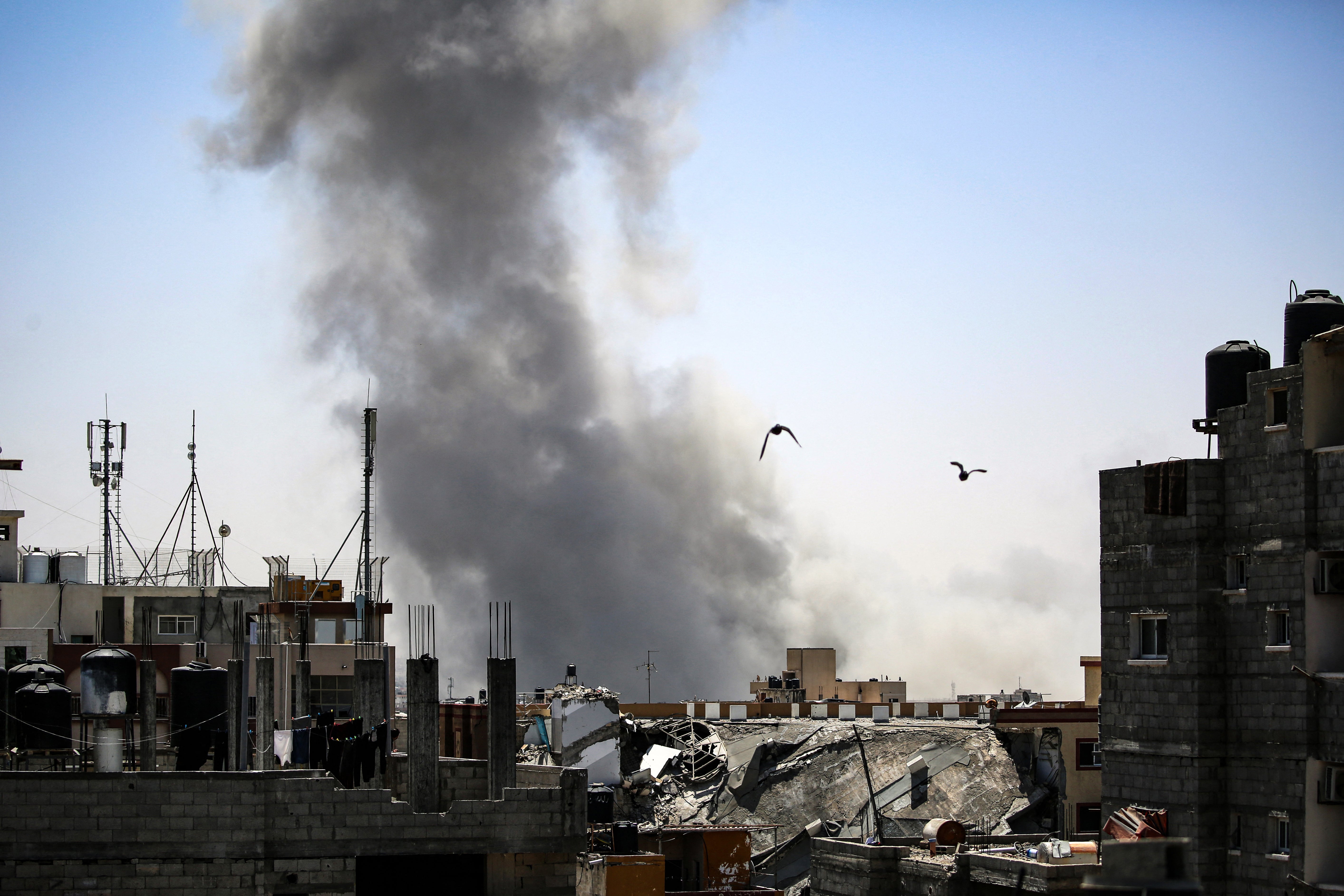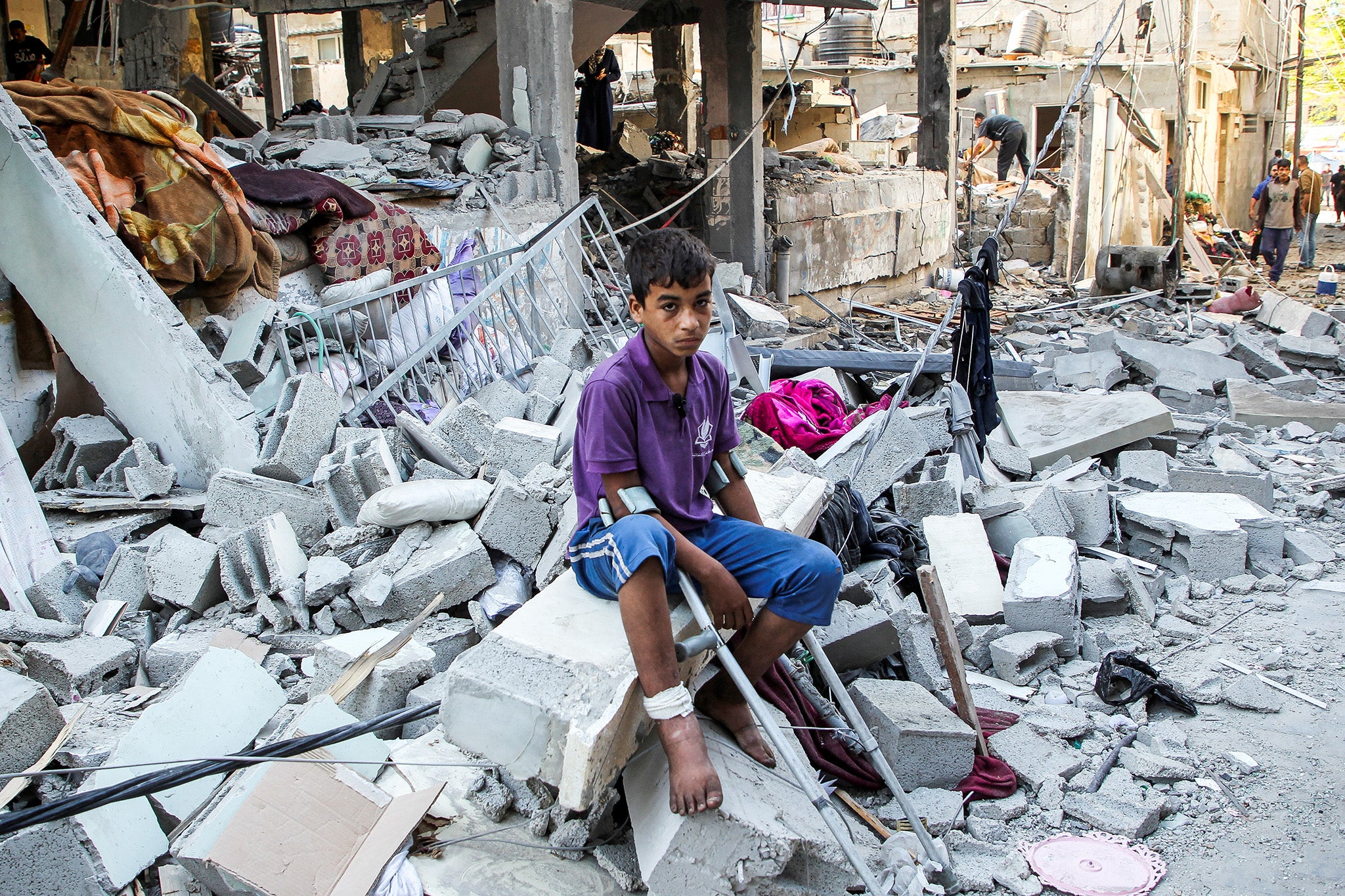‘Fear turning to terror’ as Rafah pounded by relentless strikes as Israel ignores US arms threat
Those in the Gaza border city say strikes are shaking buildings every few minutes as Israeli government officials hit out at warning from Joe Biden that Washington will not supply the weapons for an all-out ground offensive

Israel’s bombardment of Rafah is advancing toward the densely-populated centre of the Gaza border city, where UN officials warn that “fear has turned to terror” as trapped civilians try to flee with nowhere to go.
It comes as Israeli government officials hit out at a warning from Joe Biden that the US would not supply the weapons for a full-scale ground assault.
The US president told CNN he was worried about the impact on more than a million people, most of the displaced from other parts of the destroyed strip, who are sheltering in Rafah mostly in tents.
Israeli military did not reply to requests for comment about whether it was advancing further west. But reports from the ground indicate that tanks were moving deeper into the war-ravaged city, while UN officials told The Independent the ground and buildings were shaking as waves of Israeli strikes edged closer.
“The bombardments are advancing towards the centre of Rafah. I can hear them – it’s very frequent, shaking the building every few minutes,” said Louise Wateridge, from the UN’s Relief and Works Agency for Palestinian Refugees (UNRWA) from inside Rafah.
“Fear is turning into terror here in western Rafah – there are intensified bombardments creeping in from the east, drones above and navy fire from the sea. People feel trapped and have no clue where to go or what to do.”
Residents in Rafah, meanwhile, have few places to turn, wary of the “safe zones” that Israel has said they should evacuate to, given the bombardment across Gaza. Civilians told The Independent that there were people who didn’t have enough money to evacuate as fuel was scarce ever since Rafah closed.

Food prices had soared and some staples including sugar and baby milk were beginning to disappear from the shelves, they said.
Nedal, speaking in west Rafah, said that people were attempting to flee but had nowhere to go even if they could leave.
“Many people tried to go to the so-called humanitarian zones only to find there is no space there at all,” he said.
Others had little hope of a ceasefire being negotiated in talks taking place in Cairo, where Egyptian and Qatari negotiators were desperately seeking a deal before the fighting escalated in Rafah.
“I do not see any chance for a truce in the near future. I think the war will last for three months,” said Alaa Abu Al Kahir, in the besieged city.
“The negotiations are a licence to kill the people of Rafah. They have taken months, and the result has always been nothing but more victims.”
The UN said in an update that 80,000 people had fled Rafah since Monday, including 47,500 leaving shelters run by UNRWA on Wednesday alone. Some reports suggested the number of people who had left had reached 100,000 by Thursday afternoon.
The Israeli military maintained Rafah was the last stronghold of Hamas and so it had launched a “precise counterterrorism operation” to destroy their remaining brigades and to free the hostages.

On Thursday the military shared footage showing aid going through Kerem Shalom Crossing into south Gaza which they have recently reopened. “The IDF makes every effort to provide a constant flow of aid to civilians while Hamas repeatedly shoots at Kerem Shalom,” the statement read.
Israel has launched its heaviest-ever bombardment of Gaza and a siege in retaliation for the bloody assault on south Israel by Hamas on 7 October. That attack killed almost 1,200 people while more than 250 people were taken hostage, including toddlers.
Since then, Palestinian health officials say that Israel’s bombardment has killed nearly 35,000 people, the majority of whom were women and children. The United Nations has warned of looming famine, as restrictions on aid have forced over half the 2.3 million strong population into catastrophic levels of hunger.
It is the threat to civilian lives that has pushed Mr Biden into his latest statements warning Israeli prime minister Benjamin Netanyahu that he will halt US supplies of heavy bombs and artillery shells if Israel launches a full-scale offensive.
“I made it clear that if they go into Rafah ... I’m not supplying the weapons,” Mr Biden said in an interview with CNN late on Wednesday.
It was revealed this week that the US had paused a shipment of weapons consisting of 1,800 bombs weighing 2,000lb each and 1,700 500lb bombs.
Mr Biden went further, saying: “Civilians have been killed in Gaza as a consequence of those bombs.”
The US president has repeatedly insisted that his support for Israel is “ironclad” – but there has been a growing rift between Mr Biden and Mr Netanyahu given the rising death toll in Gaza and the Israeli prime minister’s insistence that Israel needed to go into Rafah to eradicate Hamas. He is under growing pressure from hardline coalition government partners to launch a full-scale assault on the border town.

On Thursday, furious with Mr Biden’s remarks, Israeli ministers and diplomats lashed out as a public standoff between the Biden administration and the Israeli government intensified. Itamar Ben-Gvir, Israel’s hardline national security minister, wrote on X: “Hamas hearts Biden”, prompting Yair Lapid, the Israeli opposition leader, to call for the minister to be sacked immediately.
Israel’s finance minister Bezalel Smotrich vowed that the government would pursue its goals in Gaza despite the US threat.
“We will achieve complete victory in this war despite President Biden’s push back and arms embargo,” he said in a statement.
“We must continue the war until Hamas is totally eliminated and our hostages are back home. This involves conquering Rafah completely and the sooner the better.”
Meanwhile, Israel’s ambassador to the UN, Gilad Erdan, said it was “a difficult and very disappointing statement to hear”. The defence minister, Yoav Gallant, said that Israel’s “enemies and friends” should know that it would do whatever was necessary to achieve its war aims in Gaza and the north.
Mr Netanyahu did not comment publicly but reposted his speech on the eve of Holocaust Remembrance Day, again an apparent response to President Biden’s decision to withhold weapons.
In the speech, he remarks: “I say to the world leaders, no pressure, however heavy, no decision by any international forum, will deter Israel from defending itself. If Israel is forced to stand alone, it will do so.”
Sky News also reported a source close to the Israeli leader as saying that Mr Biden’s weapons threat “practically buries a hostage deal at this point”.
More than 80 per cent of Gaza’s population is displaced; hundreds of thousands have fled to Rafah, along the border with Egypt, where most live in tents.
Israel has said Rafah is the last stronghold for Hamas and Mr Netanyahu has called their incursion into the city a “significant step” in the efforts to defeat the militant group. Earlier this week Israel took control of the Palestinian side of the Rafah crossing, strangling a key artery of aid, the UN said.
“The toll on these families is unbearable. Nowhere is safe,” the UNWRA said in a post on X, formerly Twitter.
The UK’s foreign secretary, David Cameron, meanwhile defended UK arms sales to Israel hours after Mr Biden’s remarks, saying they were smaller in scale and policed by strict rules. Lord Cameron added that Britain could not support a major Israeli offensive on Rafah without a plan to protect civilian lives.
Join our commenting forum
Join thought-provoking conversations, follow other Independent readers and see their replies
Comments
Bookmark popover
Removed from bookmarks